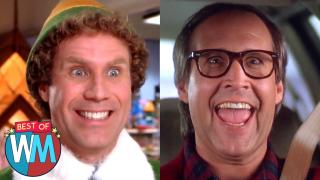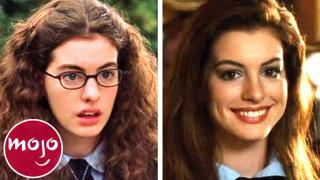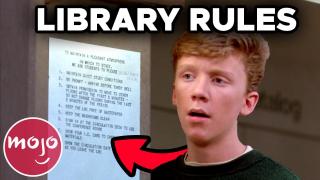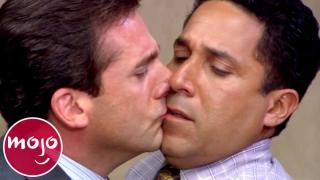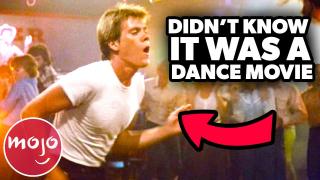Top 10 Things You Didn't Know About It's A Wonderful Life
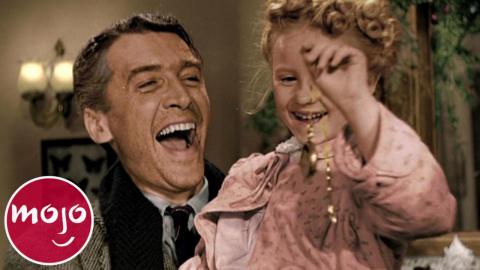
#10: It’s Based on a Personal Christmas Card
Top 10 Classic Christmas Movies: Best of WatchMojo
This classic started its wonderful life as a failure. The movie is based on a short story by a Civil War historian named Philip Van Doren Stern. The 4,100-word story, titled “The Greatest Gift,” was four years in the making, but despite Stern’s commitment and valiant efforts, he was unable to secure a publisher. Supposedly feeling rather defeated, he instead decided to send it out to various friends and family members as a Christmas card. Luckily, fortune was on Stern’s side. His Christmas card somehow made its way into the hands of David Hempstead, a producer at RKO Pictures. He took an interest in the work, and the production company purchased the movie rights for $10,000 - just under $150,000 in today’s money!
#9: One of the First Movies Released on CD
Top 10 Unrealistic Things That Always Happen To Women In Movies
“It’s a Wonderful Life” was released on VHS numerous times throughout the ‘80s and early ‘90s. But things changed forever in 1993 thanks to the advent of CDs. A company called Kinesoft Development released the movie on CD-ROM, predating the DVD by several years. It was played through a Windows PC and even contained some DVD-like special features, like the inclusion of the shooting script that allowed fans to follow along as the movie played. It became the longest video that could be played on a personal home computer, which at that point was limited to about 35 minutes of video playback. Technological advancement aside, the picture was reportedly quite poor.
#8: The Bedford Falls Set
Top 10 Things You Didn't Notice In The Breakfast Club
Bedford Falls seems like such a nice, quaint little town, and it makes the perfect setting for an introspective and personal Christmas movie. And it’s all fake. Bedford Falls was nothing but a movie set, and it was absolutely enormous. The sets were originally designed for a 1931 epic called “Cimarron,” which won the Academy Award for Outstanding Production. The set covered four acres of land, and the main street stretched the equivalent of three city blocks. The set also consisted of a working bank, 75 individual buildings, and twenty full-grown oak trees that were planted specifically for the movie. It was a genuine winter wonderland. Only...
#7: The Set Was Boiling
Top 10 Things You Missed in Legally Blonde
As impressive as the set was, filming on it proved quite a nightmare for the cast and crew. The movie was filmed in California from April to July of 1946. In the middle of a heat wave. Needless to say, the soundstage grew quite hot and uncomfortable. The set would reportedly hover between 90 and 100 degrees, an uncomfortable situation that was made even worse by the wearing of large, bulky winter coats. The situation grew so dire that some people suffered from heat exhaustion, forcing director Frank Capra to give everyone an unscheduled day off. (xref) During George’s attempt on his own life, visible beads of sweat are plastered to Jimmy Stewart’s face. It was certainly uncomfortable for him, but at least it made the scene more convincing!
#6: The Bank Kiss Was Improvised
Top 10 Improvised Kiss Scenes
During the bank run scene, Miss Davis tells George that she needs $17.50, resulting in George leaning over the counter and kissing her on the cheek. This kiss was not in the script, and the brief smile that flashes across Davis’ face was a genuine look of surprise. In the script, Miss Davis replies that she needs $17. However, the director told actress Ellen Corby to say $17.50 during filming, as he thought the odd number would make for a funny request. Stewart certainly thought so as well, judging by the impromptu kiss. (xref) That wasn’t the only bit of genuine spontaneity, as Uncle Billy’s drunken mishap was actually the result of an off-screen accident and some quick improv from actor Thomas Mitchell.
#5: Taboo Script
Society has come a long way since 1946, and what was considered taboo back then may seem like playground banter today. Some changes were made to the script to appease RKO, much of which seems tame and mild to our modern ears. For example, characters couldn’t utter the words “impotent,” “I wish to God,” “jerk,” or even “lousy.” Violet was also scripted to say “I was out all night,” but RKO requested that the words “all night” be taken out for suggestive reasons. Onscreen drinking was also a problem, with RKO requesting that no drinking be seen on screen and that “George should not be played offensively drunken.”
#4: Bobby Anderson’s Bleeding Ear
The late Bobby Anderson played Young George Bailey. Unfortunately, the shooting experience proved a little troublesome for the young actor. One scene required Mr. Gower to smack George across the face, so H.B. Warner decided to smack Anderson for real. The slap proved so brutal that it caused Anderson’s ear to bleed - the blood and tears coming from Young George are completely real. As Anderson told the LA Times, “He actually bloodied my ear. My ear was beat up, and my face was red and I was in tears.” After filming was completed, Warner reportedly hugged Anderson as a means of comfort and reconciliation.
#3: A New Type of Snow
Top 10 Things You Didn’t Know About Han Solo
Before “It’s a Wonderful Life,” on-screen snow was typically made with painted cornflakes. Unfortunately, these proved so crunchy and loud that entire bits of dialogue needed to be redone through ADR. In came Russell Shearman, the head of RKO’s special effects unit. He developed a new type of snow by combining foamite, sugar, water, and soap flakes. This unique combination looked real, proved quiet, and allowed for quick spraying throughout the set. Placing the concoction in front of a giant fan also allowed the fake snow to disperse in a realistic and convincing fashion. The new concoction proved so groundbreaking that Shearman was awarded a Technical Achievement Award at the 19th Academy Awards ceremony.
#2: It Originally Concerned Politics
Top 10 Things You Didn't Know About Footloose
In the finished film, George Bailey is a building and loan banker who has fallen upon hard times and considers taking his own life. However, this is a major departure from the original script, in which Bailey is presented as a defeated politician. Screenwriter and novelist Dalton Trumbo, perhaps best known for writing “Spartacus,” wrote an early draft of the script that was ultimately scrapped. In his version, Bailey is an idealistic politician who eventually grows more cynical owing to the demands and complexities of the job. He eventually loses an election, resulting in his attempt. That’s when Clarence arrived and showed Bailey a life in which he ignored politics in favor of business. Nearly all of Trumbo’s ideas were ignored upon later rewrites.
#1: It Only Became Successful Because It Was Cheap
Top 20 Most Successful Foreign Films
The best things in life really are free. Or, at least, really cheap. When originally released in 1946, the movie received middling reviews from critics and bombed at the box office. It was generally ignored for the next couple of decades until popular opinion started to turn in the ‘80s. A clerical error caused the copyright to expire in 1974, effectively placing the movie’s images in the public domain. TV stations still had to pay royalties to Philip Van Doren Stern, as he had successfully renewed the copyright to “The Greatest Gift.” But the movie was cheap, and countless TV stations picked it up for Christmas content. This ended in 1993 when Republic Pictures won a court ruling and NBC was granted sole TV rights.


